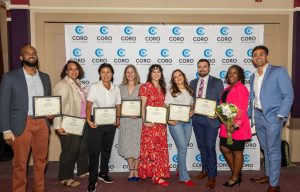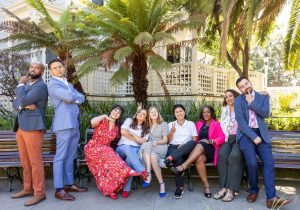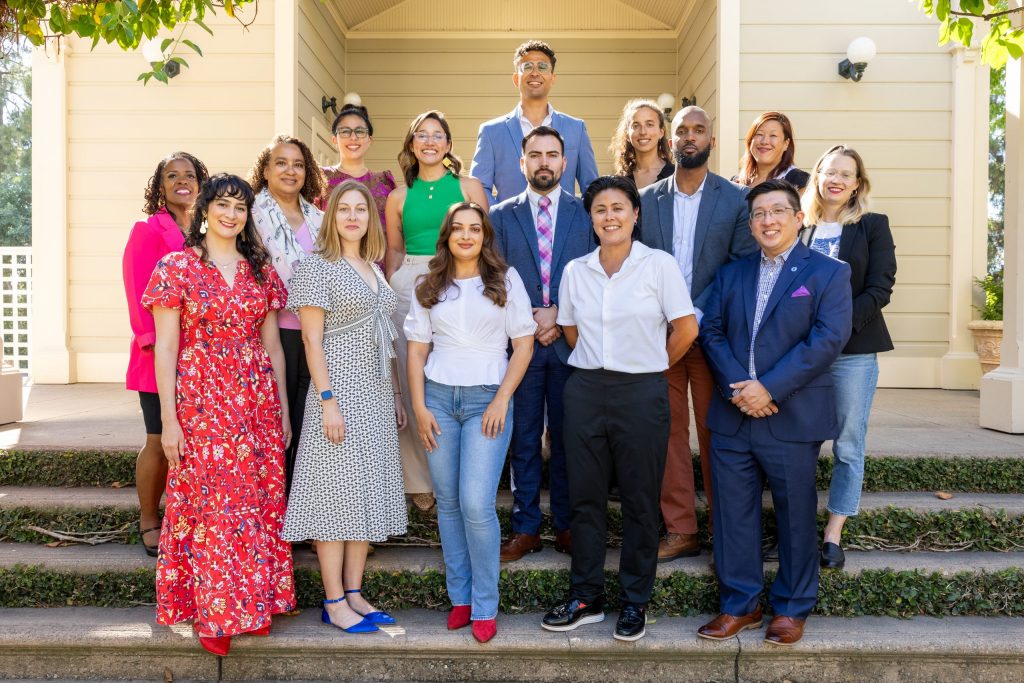
“The Partnership for the Bay’s Future fellowship took 5 years of professional affordable housing experiences and packed it into a 24-month period,” reflects 2022–24 policy grant fellow alum Gregory Earnest. “ I cannot think of another role where I consistently interacted with representatives from the public, private, nonprofit and philanthropic sectors to achieve a common goal. Working as a PBF fellow gave me an incredible broad set of skills and experiences. I feel prepared and qualified to work as an affordable housing developer, lender, or policy leader.”
Earnest was just one of 10 fellows who recently completed the Partnership for the Bay’s Future (PBF) policy grant fellowship, a two-year, full-time, cohort-based, and salaried position for experienced, entrepreneurial, and equity-minded affordable housing professionals interested in leading collaborative policy making efforts in selected Bay Area cities. Each Fellow works with one selected local jurisdiction and a community organization committed to working collaboratively on the adoption of equitable and inclusive affordable housing policy.
PBF envisions a Bay Area where people of all ages and backgrounds can find affordable homes and thrive in communities where everyone feels a sense of belonging. In the span of two years – Fellows successfully put together 111 community meetings reaching over 2,300 people and were instrumental in 11 policies or ordinances being adopted by their respective jurisdictions.
“The work our Fellows are engaged in is pivotal to realizing this vision of an inclusive and affordable Bay Area,” says Cliff Yee, Vice President of Programs and Leadership Development at Coro Northern California, and the fellowship administrator. “This program offers an incredible opportunity to make a transformative impact in our region, and we are eagerly preparing for our next cohort in partnership with the San Francisco Foundation and Enterprise Community Partners.”
Applications are now open for the third cohort of Partnership for the Bay’s Future Fellowship, and in celebration of that, here’s a look back at the work they have accomplished and their reflections on the experience.
 What The Fellows Learned and Their Impact
What The Fellows Learned and Their Impact
Leadership is a lifelong practice that can be exercised by anyone, anywhere, and at any time. Through Coro seminars, PBF Fellows were instilled with tools to cultivate self-awareness, critical thinking, communication, inclusion, collaboration, and influence. Coro trains leaders to look inward at your motivations and behaviors, look outward at who you are leading and working with, and look forward to the goal you are working toward. Here are some of the Fellows key affordable housing leadership learnings:
Inclusion: Consider who you are involving in your efforts
“PBF has inspired me to push for more cross-sector collaboration and to seek out the voices of people with lived experience to make sure the right people are at the table and that policies are designed with community,” says alum Meredith Rupp.
During her placement with the City of Antioch alongside community partners Hope Solutions and Multi-Faith ACTION Coalition (MFAC), Rupp and her team facilitated 14 listening sessions, engaging more than 450 residents – a majority of which were primarily low-income, at food distribution centers and churches across the city. Together Rupp and her site team were able to develop two policies – one leveraging unused faith-owned land to build affordable housing and the other removing barriers for low-income homeowners to build Accessory Dwelling Units (ADUs).
Critical Thinking: Data can move a policy forward
In July of 2023, the City of Berkeley adopted a Housing Preference Policy that would prioritize displaced families and their descendants for placement in affordable housing, in partnership with Healthy Black Families. The policy was created after years of discussions with residents and community organizations, including Healthy Black Families (HBF) and East Bay Community Law Center (EBCLC) to address gentrification and displacement in Berkeley.
In the 1970s, construction of the Ashby BART station resulted in an eminent domain taking of property in the historically Black and culturally rich South Berkeley neighborhood known as the Adeline Corridor. Since then, the demographics of Berkeley have changed dramatically; though Berkeley’s Black residents made up nearly a quarter of the population in 1970, they account for less than 8% of the population today. As a reparative and housing centered strategy, the Berkeley Mayor’s Office has established the Equitable Black Berkeley initiative, in tandem with the proposed large scale housing development at Ashby BART, to ensure Black families have a right to stay, right to return, a right to own/build equity, and have the infrastructure within their community to thrive. https://belonging.berkeley.edu/affordable-housing-local-reparations-black-americans-case-studies
“I learned a lot from Healthy Black Families about community engagement and the importance of data in supporting a program or policy,” shares alum Gail McGuire. “Also, I appreciate the intersectionality of health and housing within a reparative framework. I learned how ideas evolve and as long as you keep honing and iterating the work, while remaining focused on the big picture, you can achieve something progressive and meaningful.”
Collaboration: Key to Moving Affordable Housing Policy
Through the PBF model Hannah Phalen Tinsley learned how to build and maintain multi-sector coalitions that create the “strongest policies” due to meaningful and diverse input.
Together in partnership with the Housing Authority of the County of Contra Costa (HACCC), Community Housing Development Corporation of North Richmond (CHDC), and Richmond LAND, their team has been working on the redevelopment of North Richmond’s Las Deltas Housing Projects.
“Government became more involved with community based organizations, and organizations in our jurisdiction found new ways they could work together and supplement each other’s work,” she says.
In thinking about the fellowship experience as a whole, Nori Dubon who worked with the City of South San Francisco and Housing Leadership Council of San Mateo County remarks, “The fellowship has equipped me with invaluable skills in policy analysis, stakeholder engagement, and project management. I’ve learned to navigate the intricate landscape of housing policy, from identifying community needs to advocating for inclusive and sustainable solutions.”
“I am now part of a dynamic network of brilliant, dedicated, and passionate individuals—thought partners, colleagues, accomplices, and friends—who inspire me every day,” adds alum Kaitlyn Quackenbush, also PBF’s new senior director. “This fellowship has given me not just a renewed sense of purpose but a true sense of belonging.”
